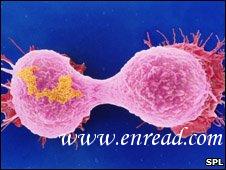| ||||||||||||||||||||||||||||||||||||||||||||||||||||||||||||||||||||||||||||||||||||||||
|
A gene1 that allows cancer to spread into the brain has been identified by US scientists. 美国科学家发现允许癌细胞扩散到大脑的基因。 Breast cancer is the commonest cancer in UK women The brain is well protected by a network of defences, and it can be very difficult for foreign substances such as viruses and drugs to gain access. But scientists have discovered a gene which appears to give spreading breast cancer cells a "free pass". The study, published in the journal Nature, raises hopes of new drug therapy to stop cancer spread. The brain is protected by a densely-packed network of tiny blood vessels2 known as the blood-brain barrier. This barrier prevents cells and molecules3 circulating in the general bloodstream from entering the brain tissue. Breast cancer can spread to the brain, but usually only does so years after the primary tumour4(肿瘤) has been removed - suggesting that the remaining cancer cells must acquire specialised properties to breach5 the brain's defences. The researchers, from the Memorial Sloan-Kettering Cancer Center, examined tissue samples, and used sophisticated genetic7 analysis to try to determine how this takes place. They identified three genes in mice which are involved in the spread of breast cancer to the brain. Two of the genes - COX2 and HBEGF - have already been shown to help breast cancer invade the lungs, suggesting they play a general role in the spread of secondary tumours8. But the third gene, ST6GALNAC5, appeared only to be involved in helping9 the cancer penetrate10(穿透,渗透) the brain. This gene seems to work by helping breast cancer cells "stick" to blood vessels in the brain, which allows them to slip through into the brain tissue. Without ST6GALNAC5, the cells fail to breach the blood-brain barrier. Important implications Liz Baker11, senior science information officer at Cancer Research UK, said: "While this work is at an early stage, and was only carried out in mice, it could have important implications for breast cancer treatment in the future. "Around 10% of breast cancers that spread will travel to the brain, and the outlook for these patients can be quite poor. "Cancer spread is one of the most challenging aspects of the disease so we welcome this discovery." Professor Sir David Lane, Cancer Research UK's chief scientist, described the study as "very exciting". He said: "The genes they've identified could become good targets for new drugs as well as some existing medicines, so they offer hope of being able to block this particular form of metastasis. "One of the reasons why cancer is so hard to treat unless we catch it early is because it spreads." 点击  收听单词发音 收听单词发音
|
||||||||||||||||||||||||||||||||||||||||||||||||||||||||||||||||||||||||||||||||||||||||
- 发表评论
-
- 最新评论 进入详细评论页>>




